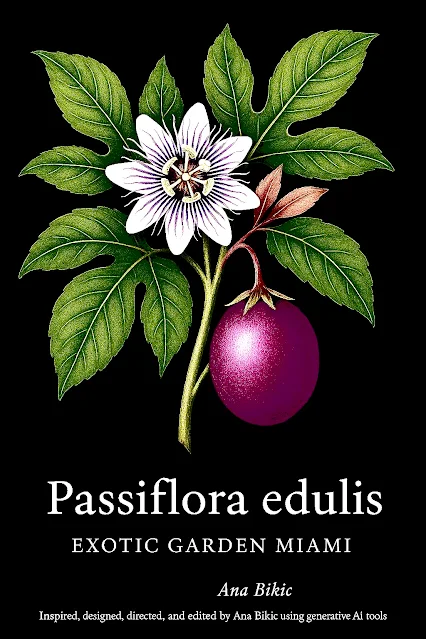 |
| Passiflora Edulis Passion Fruit Care Exotic Garden Miami Tropical Flowers Edible Fruit |
Passiflora Edulis – Passion Fruit
Exotic Garden Miami – Tropical Flowers and Fruit
Scientific Name: Passiflora edulis
Common Name: Passion Fruit Vine
Place of Origin:
Native to Brazil, Paraguay, and northern Argentina. Widely cultivated in tropical and subtropical regions around the world.
USDA Growing Zone:
Zones 9–11. It can be grown in colder zones as a summer annual or indoor vine with support.
Soil pH:
Prefers slightly acidic soil — pH 6.0 to 6.5.
Watering:
Needs regular deep watering, especially when fruiting. Keep soil consistently moist but not soggy.
Fertilizing:
Apply a high-phosphorus fertilizer monthly during the growing and blooming season. Supplement with magnesium and potassium for strong fruiting.
Pruning:
- Prune to remove old or dead growth, control size, and encourage flowering.
- Prune lightly after fruiting to stimulate new flowering shoots.
Light Requirements:
Full sun to partial shade. Needs a minimum of 6 hours of sun for fruit production.
Perennial or Annual:
Perennial vine in frost-free climates.
Annuals in cooler areas unless brought indoors.
Tropical Traits & Flowering Behavior:
- Scent: Mildly fragrant citrus-floral scent. Stronger in early morning when blooms open.
- Pollination: Primarily by bees (especially carpenter bees), and occasionally by butterflies or hummingbirds.
- Growing Placement:
- Ideal for fences, trellises, pergolas, or large containers by the pool.
- Can be grown indoors with bright light and structure for climbing.
Medicinal Properties & Safety:
- Traditional Uses: Used for stress relief, sleep aid, digestive health, and immune support.
- Compounds/Vitamins:
- Rich in Vitamin C, A, B-complex, iron, and fiber.
- Contains passiflorine, alkaloids, and flavonoids with calming effects.
- Toxicity:
- Fruit is safe and edible.
- Leaves contain cyanogenic glycosides and should be used with care or dried properly.
- Not recommended for pets or unsupervised use of leaves.
- Lab Studies: Support its anxiolytic (anti-anxiety), sedative, and antioxidant effects.
Passiflora Edulis, Passion Fruit, Exotic Garden Miami, Tropical Vine, Citrus Scent, Medicinal Plant, Pollinated By Bees, Edible Fruit, Full Sun Plant, Perennial Climber, Vitamin C Rich
Passiflora Edulis, Passion Fruit Vine, Exotic Garden Miami, Tropical Climbing Plant, Full Sun Plant, Citrus Fragrant Flower, Pollinated By Bees, Indoor Trellis Vine, Medicinal Garden Plant, Rich In Vitamin C, Natural Sedative, Anxiety Relief Plant, Edible Tropical Fruit, Fruit Producing Vine, Immune Boosting Plant, Passionflower Herbal Uses, Subtropical Gardening, Trellis Growing Plant, Poolside Flowering Vine, Large Showy Flowers, Container Fruit Vine, Rare Tropical Fruit, High Potassium Plant, Passion Fruit Anti Inflammatory, Fragrant Climbing Vine

Comments
Post a Comment